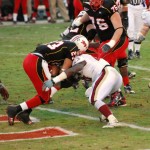Knowledge Redeployment
Posted on December 14, 2006 by Robert Ringer
My first love is learning, which is why I keep my brain on autopilot when it comes to absorbing everything around me and extracting lessons from what I see and hear. It borders on an addiction.
Extracting knowledge, however, is not enough. You must be able to apply what you’ve learned to other situations, including situations that are far removed from the one where the original knowledge was acquired. I like to refer to this skill as “knowledge redeployment.”
Because time is a limiting factor in life, knowledge redeployment is a key ingredient when it comes to success. If you have to relearn the same lesson over and over again in each new situation, you’d better figure out a way to live as long as Methuselah if you hope to succeed.
If you keep your eyes and ears open and raise your level of awareness, you’ll be amazed at how many lessons you can learn from even experiences that seem, on the surface, to be innocuous. Sometimes, you gain new knowledge; other times, it’s just a reminder of something you already know. Either way, the important thing is to make mental notes of what you observe, then apply your newly acquired knowledge to other situations. I offer the following example to make my point:
A friend recently offered to give me three tickets to an upcoming Washington Wizards-Atlanta Hawks basketball game. He said he would have the tickets delivered to the Will Call window, and all I would need to do was show my personal I.D. when I arrived.
As always, my learning antennae were on autopilot, so for me it was much more of a learning experience than a basketball game. And here are the lessons I learned (again).
Lesson No. 1: When it comes to matters of importance, don’t depend on others to follow through.
I strutted up to the Will Call window as though I had absolutely nothing to worry about. But the truth of the matter is that it was all an act. Will Call windows fly in the face of my modus operandi.
I’ve learned the hard way over the years not to have tickets left at Will Call, so it didn’t shock me when my friend’s tickets were not at the Will Call window. It immediately brought to mind one of my oldest rules: When the ball is on the one-yard line, never risk a fumble; carry it over yourself.
For example, when it comes to tickets, if at all possible make a special trip to pick them up in advance of the event — or, if necessary, send someone (whom you can trust) in your place rather than relying on someone you don’t know to take them to the Will Call window.
Failing that, have the tickets overnighted to you. Paying the extra $10-$15 is worth the peace of mind. Tickets are like a check that hasn’t yet cleared the bank. The only time you actually have a ticket to a game is when it’s in your hand.
But it’s important to understand that this isn’t just about tickets. “Will Call” is a metaphor for an infinite number of other situations in life. The problem with leading a will-call life is that there are too many lazy, negligent people in the world who possess a remarkable talent for not following through.
Whether it involves personal or business matters, to the extent you lead a will-call life, you relinquish control of your destiny to others.
Lesson No. 2: Assess the supply-and-demand aspects of every situation.
Knowing that the game had just started, I went outside to see if there were any scalpers around. Since the Wizards were playing the Atlanta Hawks, I figured tickets would be relatively cheap. But perhaps the most important of all supply-and-demand factors was that the game had already started.
When I was in my late teens, I was in the produce business, and I learned a lot about perishable inventory. Whatever you don’t sell by the end of the day is a problem. If you’re selling strawberries, for example, you had better have a place to refrigerate them. If you do, maybe you’ll have one more day to get rid of them.
But to play it safe, as the sun begins to set, you start offering your leftover strawberries at a discount — and with each passing minute, the discount becomes greater. In some situations, I actually gave produce away rather than ending up with moldy merchandise the next day.
By redeploying this knowledge to the business of scalping tickets, I have always related ticket scalpers to fruit peddlers. If a scalper still has tickets once a game begins, he’s holding perishable merchandise. You can sometimes sell questionable strawberries the next day at a discount, but not so with yesterday’s tickets. When the game is over, the tickets are over. Scalpers buy inventory in the hopes of making a profit, sometimes even a killing. But they also run the risk of taking a bath if some unforeseen factor comes into play.
Lesson No. 3: The first offer is never the best offer.
Once outside the lobby of the Verizon Center, a scalper approached me and offered me three tickets — $75/ticket face value — for $45 apiece. Not only did I have Lesson No. 2 firmly in mind, I also instantly recalled something my father had taught me years earlier: The first offer you hear is never the best offer!
I pleaded a shortage of cash and began to walk away from the scalper, confident he would pursue me. And, sure enough, he did — immediately. Just like that, the price dropped to $35 a ticket.
It was tempting to take them off his hands at the bargain price of $35 each, but I couldn’t resist pushing the envelope a bit further. Without flinching, I told him that $25 a ticket was all I could afford, whereupon he acted insulted and started to walk away.
As he was departing, I said, “I don’t blame you for not wanting to sell those tickets for $25 each. If I were you, I’d try to find someone who would pay me closer to what they’re worth.” As those words came out of my mouth, I was, of course, cognizant of the fact that the sidewalk in front of the Verizon Center was almost devoid of people.
Sure enough, within seconds the scalper chased after me and said, “Okay, I’m taking a big loss on these tickets (a line all scalpers use to evoke guilt feelings in buyers), but you can have them for $25 apiece.”
It wasn’t as good as it would have been if my friend’s free tickets had shown up at the Will Call window, but by redeploying knowledge learned from past experiences, I was able to get $225 worth of tickets for $75.
If you become good at redeploying this kind of negotiating skill when it comes to purchasing something as substantial as real estate, you might just end up making a fortune.
Lesson No. 4: Most perceived bad situations are easily resolved.
This is perhaps the most important lesson of all, especially if you have high blood pressure. Experience has taught me that most perceived problems never come to pass, which means we do an awful lot of worrying for nothing. But even those problems that do come to pass can usually be resolved much easier than expected. Bottom line: We ended up seeing the game, it didn’t cost us much, and we had a great time. No problem at all.
The overarching lesson in all this is to become an insatiable learner and concentrate on raising your level of awareness. Then, use your heightened state of awareness to redeploy the knowledge you’ve gained through past experiences. Becoming adept at knowledge redeployment can make a huge difference in the quality of your life.










